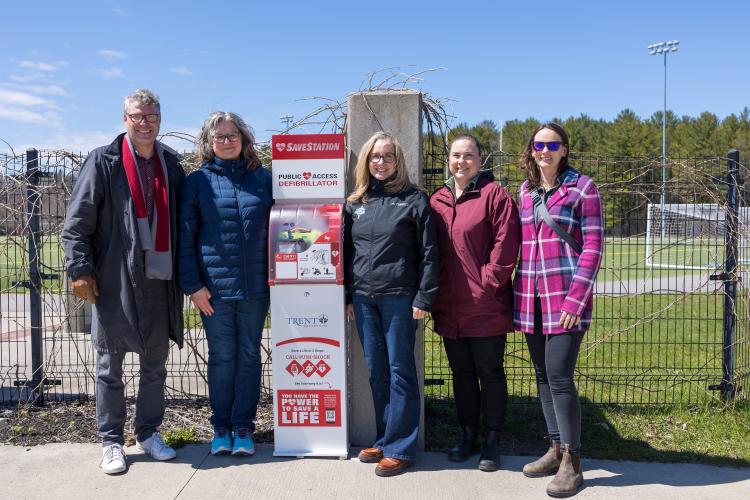Trent University partners with Action First Aid to create a cardiac safe environment for students, staff, and visitors by implementing the strategic placement of 37 lifesaving and publicly accessible automated external defibrillators (AEDs) across its campuses in Peterborough and Durham.

AEDs are portable eleabtronic devices that require no training and are used in combination with CPR to restart a heart after it stops beating. According to the Canadian Heart and Stroke Foundation, one out-of-hospital cardiac arrest happens every nine minutes, and the chances of survival double when an AED is used.
Over the past year, an internal cross-departmental working group including the Joint Health & Safety Committee, Campus Security, Athletics & Recreation, and Facilities Management took action on a proposal that saw the number of AEDs on Trent campuses increase from 11 to 37. This total includes four outdoor climate-controlled cabinets, making Trent one of only two Canadian universities to provide the public access to an AED 24/7/365.
"AEDs have been successfully used twice in the past 10 years to treat sudden cardiac arrest at Trent, so part of the decision to increase the number of units was because we know they are effective," said Elyse Sawdon, manager of Environmental Health and Safety. "AEDs can be used by anyone, you don't need any special training as they are smart, interactive devices which emit voice prompts and walk people through the steps. As such, they are a strong and obvious choice to enhance our health and safety measures for everyone who works, studies, plays, and visits on campus."
Subject matter expert and Canadian-based First Aid training agency, Action First Aid, was selected as project partner and AED vendor. Trent benefited from the organization's 25 years of knowledge and resources through strategy and public education consultation, and the adoption of a sophisticated online tracking tool to inspect and maintain units.
"Our team has been really impressed with how Trent approached this entire project," said Deb Hennig, president of Action First Aid. "They adopted our recommended four-minute mindset' that optimizes the placement of units ensuring accessibility within the short timeframe that's crucial for saving the life of someone experiencing sudden cardiac arrest."
She added: "By embracing new technology and being one of the first universities in Canada to strategically place outdoor SaveStations, Trent has created a safer environment for its community and is a great example for other institutions."
By equipping various campus buildings, facilities, teams, and open spaces with AEDs, Trent is poised to be in compliance with Ontario's Defibrillator Registration and Public Access Act when it comes into force (date unknown). The specific locations of the AED cabinets across Symons campus (26), Traill College in downtown Peterborough (2), Durham campus (3 + 1 at the Advanced Learning Centre in downtown Oshawa) can be found on the campus map, under the header of First Aid. In addition to the cabinets, five portable units are carried by members of Campus Safety, Athletics & Recreation, and the student-run Trent University Emergency First Response Team (TUEFRT).
"The value of having an integrated institutional AED program at Trent cannot be overstated," said Leslie Spooner, assistant director of customer engagement and operations within Athletics. "The impact of the program extends beyond the physical presence of the devices, signifying a culture of care and responsibility for the well-being of our community."
More information about AEDs can be found on Trent's Health & Safety website, including the Creating a Cardiac Safe Campus case study video about Trent's AED project.








